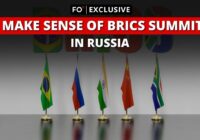Despite the eurocrisis, Europe as an idea is popular but Europe as a set of institutions is not.
In 2007, 70% of Spanish citizens held a favorable opinion on the European Union (EU). After seven years of recession, banking collapses and sovereign debt crisis, support stands at just 50%, two points below the United Kingdom’s.
This is not the only area where euro-skepticism has taken hold in Spanish public opinion, however. Only 38% of Spaniards believe that “[European] economic integration has strengthened the economy.” In Britain, the figures lies at 41%.
These statistics come from an analysis by the Pew Research Center. On May 12, the center published the results of a survey involving 7,022 people in Germany, France, Britain, Italy, Spain, Poland and Greece during March and April. The study proved the perception of the EU is linked to the performance of national economies in the crisis.
68% of people believe that “my vote does not count in Brussels,” 65% claim the EU “does not understand the needs of citizens,” and 63% that the EU is “inefficient.”
By far, Germany and Poland hold highly favorable views of the EU, while Greece leads the euro-skeptics block, followed by Italy and Spain. France seems somewhat in between. The UK proves, once again, that the state of the economy is critical for a nation’s attitude toward the EU. In just one year, British support for the economic effects of the EU has risen by 15 points, while the UK’s view of the Union has improved by nine. So much for Britain’s supposed level headedness.
In the Spanish case, the disenchantment with the EU is astonishing: 68% of people believe that “my vote does not count in Brussels,” 65% claim the EU “does not understand the needs of citizens,” and 63% that the EU is “inefficient.” The European Central Bank holds a dismal 24% support, six points below the European Commission and eight below the European Parliament.
So, is there any hope for Europe? Yes.
First of all, the Pew study shows the economy is key. In Spain, for instance, popular support for the EU has started to grow —albeit at a glacial pace — since last year.
Second, even if the specifics of the EU — its politics and institutions — receive an “F” grade, support for the idea of integration is surprisingly resilient. In fact, 50% of Spaniards hold a positive view of the EU, and larger majorities in almost every country support the euro and value the Union as an agent for good on the international stage.
The Pew Research Center study proves that Europe as an idea is popular, in spite of the crisis, but Europe as a set of institutions is not. The solution to “europhobia,” then, is in the hands of European leaders.
*[A version of this article was originally published by The Corner.]
The views expressed in this article are the author’s own and do not necessarily reflect Fair Observer’s editorial policy.
Image: Copyright © Shutterstock. All Rights Reserved
Support Fair Observer
We rely on your support for our independence, diversity and quality.
For more than 10 years, Fair Observer has been free, fair and independent. No billionaire owns us, no advertisers control us. We are a reader-supported nonprofit. Unlike many other publications, we keep our content free for readers regardless of where they live or whether they can afford to pay. We have no paywalls and no ads.
In the post-truth era of fake news, echo chambers and filter bubbles, we publish a plurality of perspectives from around the world. Anyone can publish with us, but everyone goes through a rigorous editorial process. So, you get fact-checked, well-reasoned content instead of noise.
We publish 2,500+ voices from 90+ countries. We also conduct education and training programs
on subjects ranging from digital media and journalism to writing and critical thinking. This
doesn’t come cheap. Servers, editors, trainers and web developers cost
money.
Please consider supporting us on a regular basis as a recurring donor or a
sustaining member.
Will you support FO’s journalism?
We rely on your support for our independence, diversity and quality.







Comment